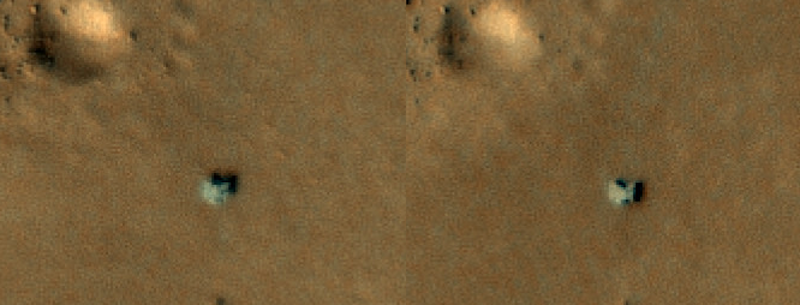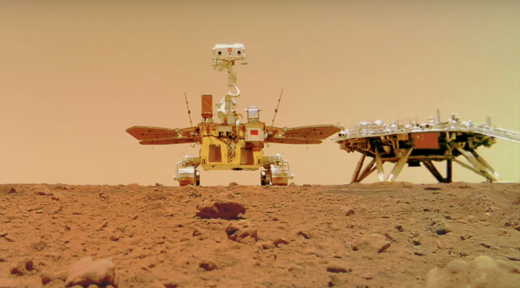China’s Zhurong rover appears to still be snoozing since entering into hibernation mode a little less than a year ago. The Chinese robot was supposed to wake up in December but recent images captured by a NASA orbiter reveal that the rover hasn’t moved from its position on the Martian surface for months.
The images, released on Tuesday, were captured by the High Resolution Imaging Science Experiment (HiRISE) camera on board NASA’s Mars Reconnaissance Orbiter. The side-by-side cutout included three separate images taken on March 11, 2022, September 8, 2022, and the most recent one captured on February 7, 2023.

The first frame shows the rover as a bluish, hazy blob at the top of the image, when the rover was still active. The second and third images show Zhurong farther down the frame resting next to a crater. The rover has not moved from this spot since entering into hibernation mode — a low power safe mode — in May 2022. Although Zhurong’s hibernation was part of the plan to avoid the harsh Martian winter season, the rover was scheduled to autonomously resume its activities in late December at the start of Martian spring.
In January, an anonymous source told the South China Morning Post that the rover has been completely quiet since entering into hibernation, but the China National Space Administration (CNSA) has been silent about the status of its rover, continuing a trend of secrecy over its missions.

The winter season on Mars is also marked by heavy sand and dust storms, which block the rover’s solar panels and prevent it from collecting sunlight to generate power. Zhurong’s solar panels could be covered by dust, reducing its ability to generate power and preventing it from turning back on, the unnamed source told SCMP last month. On the other hand, NASA’s Curiosity and Perseverance rovers are able to power through Mars’ winter season using a radioisotope power system.

On February 10, Chinese state media celebrated the Martian mission’s two year anniversary. In the post, Xinhua wrote that the Tianwen-1 orbiter, which relays data between the rover and ground control, is in good condition and will continue carrying out different tasks related to the Red Planet. However, the post failed to mention Zhurong’s current condition.
The Tianwen-1 mission is China’s first interplanetary mission, landing Zhurong on Mars on May 14, 2021. The rover was originally slated to spend 90 days exploring Mars and has far surpassed its initial timeline. So even if Zhurong doesn’t wake up from its long Martian nap, it still succeeded in making history.
More: Gigantic Dust Towers on Mars Could Explain How the Red Planet Lost its Water
